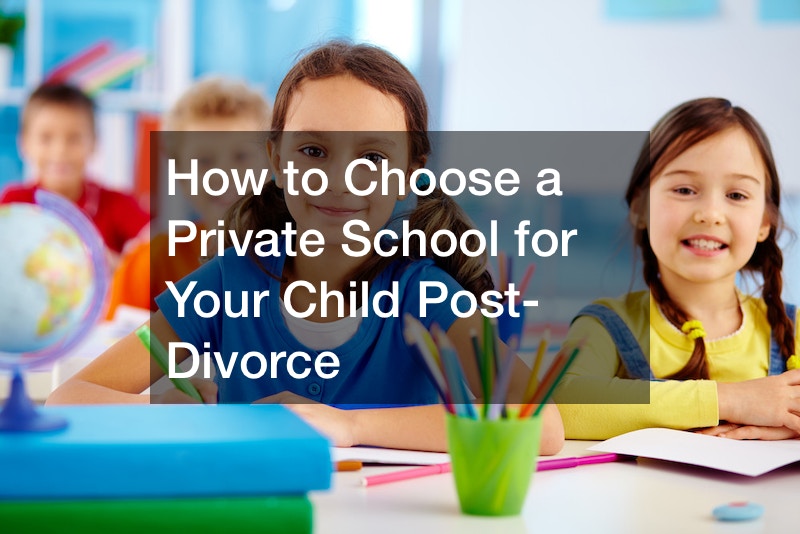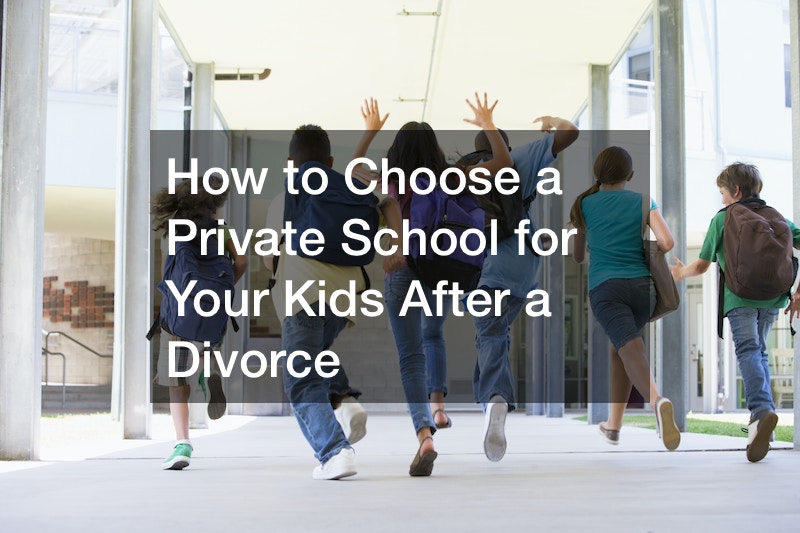
Choosing a private school for your child after a divorce requires careful consideration and thoughtful decision-making. With the myriad of options available, it’s necessary to carefully evaluate various factors to ensure the best possible educational experience. This guide will take you through how to choose a private school for your child. The tips will help you make an informed decision that provides a nurturing and enriching educational environment for your child as they navigate the post-divorce phase of their life.
Academic Reputation

Academic reputation plays a huge role in how to choose a private school for your child post-divorce. When searching for the best Montessori schools, it’s great to consider the institution’s academic standing. Start by evaluating the school’s performance indicators, such as standardized test scores, college acceptance rates, and academic awards. These metrics reflect the school’s commitment to academic excellence and can give you valuable insights into its educational quality.
In addition to performance indicators, consider the reputation of the school among parents, educators, and the local community. Seek feedback from other parents and your family attorney or conduct online research to gather information about the school’s academic reputation. Hearing about other families’ experiences can provide valuable perspectives and help you gauge the school’s academic strengths.
Furthermore, explore the specific Montessori approach implemented by the school. Look for Montessori accreditation from recognized organizations, as it ensures that the school follows authentic Montessori principles. Inquire about the qualifications and experience of the Montessori teachers, as their expertise in implementing the Montessori method is essential for your child’s educational development.
Curriculum and Teaching Methods
Assessing the curriculum and teaching methods will give you an answer to the question of how to choose a private school for your child. Understanding how the school structures its educational program and approaches teaching is vital to ensure it aligns with your child’s needs and aspirations. To effectively choose a private school for your child, consider the following factors related to curriculum and teaching methods.
Begin by examining the school’s curriculum. Look for a well-designed and comprehensive program that covers core subjects while offering a balanced range of academic disciplines and extracurricular activities. Assess whether the curriculum promotes critical thinking, problem-solving, creativity, and effective communication skills.
Next, investigate the teaching methods employed by the school. Determine if the school utilizes student-centered approaches that foster active engagement, hands-on learning, and collaboration. Look for a variety of instructional techniques, such as project-based learning or experiential learning, that cater to different learning styles and foster a love for learning.
Extracurricular Activities

After a divorce, you might be stressed on how to choose a private school for your child. When choosing a private school for your child, considering the available extracurricular activities is advisable. Extracurricular activities provide valuable opportunities for students to explore their interests, develop new skills, and foster personal growth. To make an informed decision about a private school, take into account the following aspects related to extracurricular activities.
Assess the range of extracurricular activities offered by the school. Look for a diverse selection that includes sports, arts, clubs, community service, and other areas of interest. A wide range of options ensures that your child can find activities that align with their passions and talents. Additionally, consider the depth and quality of the extracurricular programs. Are they well-organized and effectively managed? Do they provide opportunities for skill development, competitions, performances, or community engagement?
The availability of resources, facilities, and experienced coaches or instructors is also crucial for a fulfilling extracurricular experience. Make sure to examine the school’s approach to balancing academics and extracurricular activities. A private school that values and prioritizes extracurricular involvement understands the holistic development of students and encourages a healthy balance between academics and other pursuits.
Class Sizes and Student-Teacher Ratios
Want to know how to choose a private school for your child? Assess the class sizes and student-teacher ratios. These factors directly impact the quality of education and the level of individualized attention your child will receive. Smaller class sizes often lead to increased student engagement, personalized instruction, and stronger teacher-student relationships. Look for schools that prioritize maintaining manageable class sizes, as this can enhance your child’s learning experience and foster academic growth.
Consider also the student-teacher ratios. A lower ratio allows educators to devote more time and attention to each student, providing targeted support and addressing individual needs effectively. A private middle school with lower student-teacher ratios often creates a conducive learning environment, nurturing student success and development. A well-designed teaching approach combined with appropriate class sizes and student-teacher ratios can optimize your child’s learning potential.
Teaching Staff

When considering a private school for your child, make sure to assess the qualifications and certifications of the teaching staff, particularly in childcare. Look for teachers who hold relevant degrees, certifications, or licenses in early childhood education or related fields. These qualifications demonstrate their specialized knowledge and understanding of child development and effective instructional strategies.
Expertise in subject areas is another important aspect to consider when evaluating the teaching staff. Take note of the teachers’ expertise and experience in specific subjects, such as math, science, languages, or the arts. Look for figures such as advanced degrees, specialized training, or notable achievements in their respective fields. Expertise in subject areas ensures that your child receives quality instruction and guidance in various academic disciplines, fostering a well-rounded education.
Collaboration and teamwork among the teaching staff are key to creating a positive and cohesive learning environment. Inquire about how the school promotes collaboration among teachers, such as through professional learning communities or collaborative planning sessions. Effective collaboration enables teachers to share best practices, exchange ideas, and develop interdisciplinary approaches to enhance your child’s educational experience. When considering a private school for your child post-divorce, a teaching staff that values collaboration and teamwork can foster a supportive and enriching learning environment.
Campus Environment
The campus environment plays a pivotal role in how to choose a private school for your child. It encompasses various elements that contribute to their overall growth and educational experience. To choose the right private school, start by assessing the physical facilities and infrastructure. Look for well-maintained classrooms, libraries, laboratories, and recreational areas that create an enriching learning environment. A clean, organized, and accessible campus enhances your child’s educational experience.
Ensure that the daycare or early education setting prioritizes safety and security measures. Inquire about their protocols, emergency procedures, and staff training to ensure a secure environment for your child. Cultural diversity and inclusion are essential factors to consider. Look for a campus that celebrates diversity, fosters an inclusive community, and provides opportunities for students to learn from and respect different backgrounds.
Evaluate the sense of community and student engagement on campus. A strong community atmosphere promotes collaboration, friendship, and social development. Consider the availability of extracurricular activities, clubs, and programs that encourage student involvement and personal growth. Lastly, inquire about the availability of counseling and support services. A supportive campus environment provides access to resources that promote the well-being and mental health of students, especially after their parents’ divorce.
Discipline Policies and Student Support

There are various pieces of advice on how to choose a private school for your child post-divorce. One of the top ways is careful consideration of the discipline policies and student support provided by the institution. Evaluate the discipline policies to ensure they promote a safe and respectful environment aligned with your parenting values.
Inquire about the availability of student support systems, such as counseling services, academic assistance programs, and mentorship opportunities, which can help your child cope with the emotional effects of divorce and provide necessary academic support. Consider any collaboration between the school and a local divorce attorney, exploring partnerships or resources available to support families during this transitional period. Such collaboration ensures a comprehensive approach to your child’s well-being.
Thoroughly examining the discipline policies and student support systems of a private school enables you to choose an institution that prioritizes your child’s emotional well-being, academic success, and overall development post-divorce. These factors profoundly impact your child’s educational journey and overall well-being. Overall, a supportive and nurturing environment plays a significant role in helping your child navigate the challenges they may face during this time.
Values and Educational Philosophy
In the process of finding the answer to how to choose a private school for your child post-divorce, evaluating the values and educational philosophy of the institution becomes crucial. As the saying goes, ‘Education is not the filling of a pail, but the lighting of a fire.’ This perfectly captures the essence of a quality education. When considering a private school for your child post-divorce, keep the following points in mind.
Firstly, examine the core values and principles of the school. Ensure that they align with your own family values and emphasize character development, respect, and inclusivity within a supportive community. Secondly, explore the educational philosophy employed by the school. Consider if it focuses on holistic development, experiential learning, or individualized instruction, and whether it resonates with your child’s learning style and needs.
Additionally, inquire about any specialized programs or approaches offered by the school. This may include gifted education, special needs support, language immersion, or a focus on arts and sports, depending on your child’s interests and requirements. Also, consider if the school provides additional resources like tutoring service to support your child’s academic growth. These resources can be instrumental in addressing any specific learning needs and ensuring your child receives the necessary support for their educational journey.
Facilities and Resources
Stuck on how to choose a private school for your child post-divorce? Check the facilities and resources available within the institution. These aspects significantly influence your child’s educational journey and overall experience. To make an informed decision, start by assessing the classroom facilities, ensuring they are well-maintained and provide a conducive learning environment. Consider factors such as seating arrangements, classroom size, and the availability of teaching aids.
Evaluate the school’s library and media resources, looking for a diverse collection of books, digital materials, and research tools that support your child’s learning and academic growth. Consider also the presence of well-equipped science laboratories that enable hands-on experimentation and practical application of scientific concepts. Additionally, assess the availability of computer labs and technology resources, as these are important for enhancing digital literacy and preparing your child for the modern world.
Look for dedicated spaces and facilities for arts and music, promoting creativity, self-expression, and artistic development. Check the availability of sports and athletic facilities that encourage physical fitness, team building, and sportsmanship. Besides, evaluate the presence of outdoor play areas that provide opportunities for recreational activities and social interactions. Lastly, consult with a local estate planning lawyer to ascertain there’s no case touching the facilities.
Location and Transportation Options

Another tip on how to choose a private school for your child post-divorce is to consider the location and transportation options. Evaluating the proximity of the school to your home or workplace. A convenient location reduces travel time and stress for both you and your child. Assess also the transportation options available, such as school buses or public transportation. Reliable and safe transportation services can alleviate concerns about commuting logistics and ensure your child’s punctuality.
Consider the accessibility of the school for your child’s extracurricular activities or any specialized services they may require, such as tutoring or therapy sessions. While at it, examine the traffic patterns and commuting statistics in the area. Analyzing data on average commute times or traffic congestion can also help you anticipate potential challenges and plan accordingly.
Finally, don’t forget to research the availability of parking facilities or designated drop-off zones if you plan to drive your child to school. Additionally, consider the proximity of the school to local amenities and resources that may be beneficial for your family, such as parks, libraries, or healthcare facilities. Collaborating with professionals like attorneys during the decision-making process can provide valuable insights into legal considerations related to school choices and transportation arrangements.
When faced with the task of choosing a private school for your child post-divorce, it’s important to approach the decision-making process with careful consideration and planning. The factors outlined in this guide will help you make an informed choice. Professionals can provide valuable insights on how to choose a private school for your child post-divorce. In the end, selecting the right private school for your child post-divorce is an investment in their education and well-being, ensuring they receive the necessary support and opportunities to thrive academically and emotionally.



